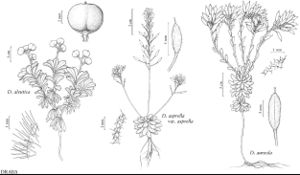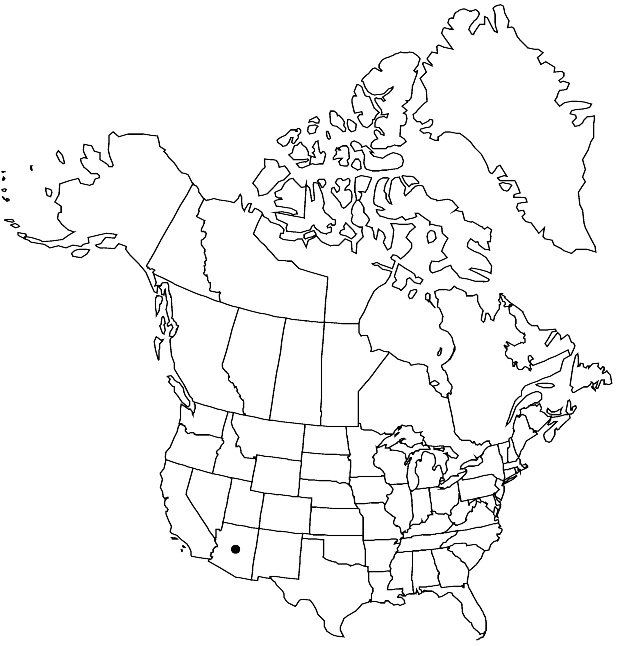Difference between revisions of "Draba asprella"
Bull. Torrey Bot. Club 10: 125. 1883.
FNA>Volume Importer |
FNA>Volume Importer |
(No difference)
| |
Revision as of 20:22, 24 September 2019
Perennials; (cespitose); caudex branched (with some persistent leaf bases); scapose. Stems unbranched, (0.4–)0.6–1.5(–2.7) dm, pubescent throughout, trichomes simple, 0.5–1.5 mm, and 2–4-rayed ones, 0.05–0.3 mm, (sometimes 2–4-rayed ones distally). Basal leaves rosulate; subsessile or shortly petiolate; petiole ciliate throughout; blade oblanceolate to spatulate or obovate, (0.6–)0.8–4.5(–6) cm × 2–12(–16) mm, margins usually entire, rarely obscurely dentate, (not ciliate), surfaces abaxially pubescent with stalked, (2–)4-rayed trichomes, 0.2–1 mm, adaxially with stalked, 2–4-rayed trichomes, 0.3–0.8 mm, and simple ones, 0.5–1.9 mm. Cauline leaves 0. Racemes (15–)30–75-flowered, ebracteate, elongated in fruit; rachis not flexuous, pubescent, trichomes 2–4-rayed, sometimes with simple ones. Fruiting pedicels horizontal to divaricate-ascending, straight, 3–11(–16) mm, pubescent, trichomes 2–4-rayed, sometimes with simple ones. Flowers: sepals broadly ovate, 1.8–3.5 mm, pubescent, (trichomes simple and short-stalked, 2–4-rayed); petals pale yellow, oblanceolate, 4–7 × 1.5–2.5 mm; anthers ovate to oblong, 0.4–0.7 mm. Fruits ovoid-ellipsoid to oblong, plane, inflated basally, 3–8 × 1.8–3.5 mm; valves hirsute, trichomes simple and spurred, (0.2–)0.3–1 mm, or puberulent, trichomes short-stalked, 2–4-rayed, 0.1–0.2 mm; ovules 8–12(–18) per ovary; style 0.6–2(–2.5) mm. Seeds oblong, 0.9–1.2 × 0.6–0.8 mm. 2n = 30.
Discussion
Varieties 2 (2 in the flora).
Both R. C. Rollins (1993) and N. H. Holmgren (2005b) indicated that the chromosome number of Draba asprella is 2n = 32, but repeated counts by one of us (M. D. Windham 2000, unpubl.) show that the species consistently has 2n = 30. Rollins divided D. asprella into four varieties encompassing tremendous variation in trichome morphology. One of these (var. zionensis) is more closely related to D. sobolifera (Windham and L. Allphin, unpubl.) and is treated herein at species rank. Within D. asprella, in the strict sense, we recognize two varieties separated primarily by the type of trichomes found on the fruits. The distinctions are not absolute and there appear to be forms connecting the two, especially in Coconino County.
Selected References
None.
Key
| 1 | Fruits hirsute, trichomes simple and unequally 2-rayed, (0.2-)0.3-1 mm. | Draba asprella var. asprella |
| 1 | Fruits puberulent, trichomes 2-4-rayed, 0.1-0.2 mm. | Draba asprella var. stelligera |

